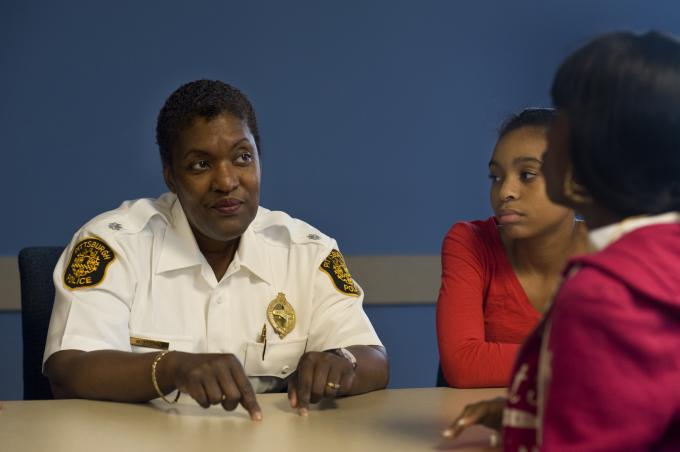Maurita Bryant embodies the credo: Protect and Serve
Alumna rises from humble beginnings to third in command on the Pittsburgh Police Force
The Point
Winter 2012

Alumna Maurita Bryant, assistant chief of the City of Pittsburgh Bureau of Police, mentors young women.
Cleaning offices in the U.S. Steel building in Downtown Pittsburgh in 1975 to support her two small children, Maurita Bryant (A&S 2006, 2007) did not foresee a 34-year career cleaning up the streets of Pittsburgh that has led her to assistant chief of the City of Pittsburgh Bureau of Police. Her desire to provide a better life for her daughters prompted her to apply to the police academy after reading an announcement that women would be hired for the first time.
After passing the test to enter the academy, Bryant had second thoughts. "I almost didn't take the job because I had never touched a gun." A woman who cleaned floors with Bryant convinced her. "She said, 'If you don't take that opportunity, you'll be here the rest of your life cleaning offices like me.'"
The soft-spoken Bryant admits she struggled with the physical portion of academy training and course work. "Taking tests and studying never came easy for me, so I had to work very hard at it."
Her hard work paid off. She now has her bachelor and master's degrees in criminal justice from Point Park and oversees the police operations branch, with six commanders and 579 officers under her charge, including the SWAT unit.
Related links
"Sometimes I feel like a fireman because that's what you do all day. You put out little fires, big fires." Bryant's 12-hour workdays involve determining what operations will benefit the city, and the best means for the six command zones to work together. "It reminds me of raising a family," Bryant says of the challenge of leading six commanders, all with different ideas and personalities.
"I tend to treat people the way I like to be treated. I try to be respectful at all times, and I try to accept people the way they are," Bryant explains. This applies not only to officers she works with but to drug dealers and prostitutes she arrested as a beat cop. "I've arrested people I've went to school with, relatives, neighbors. Just because you arrest somebody doesn't mean you have to demean them."
That philosophy of life Bryant learned the hard way, not knowing her father and living with a relative when she was young. "I didn't have the best childhood. .… In so many ways, I was a victim. I know how it feels … So, I wouldn't want anybody else to feel like that."
Despite the respect she showed others, Bryant faced discrimination on the job being one of the first women. "The men, some were just mean. They played little, nasty jokes on you." While some men were supportive, given the hierarchical hiring order - white men, black men, white women, black women - Bryant says black females were given the worst assignments in the highest crime areas. "It's almost like you had to earn your respect. … You were always being tested."
Unlike many female officers who did not last, Bryant was determined not to quit and found a role model in the first black female supervisor, Gwen Elliott. "She cared about everyone. She would give you the shirt off her back. She was smart as a whip." It was Elliott's fortitude that encouraged Bryant. "No matter how much people talked about her or tried to demean her, she kept her head up. She kept going. 'If she can do it, I can do it,'" Bryant thought.
And she did. In addition to advancing on the police force, Bryant also emulated Elliott by serving on nonprofit boards, 14 to be exact, including the National Organization of Black Law Enforcement Executives. Bryant founded Pittsburgh's chapter and will serve as national president in 2012.
Bryant loved her job from the beginning, walking the beat her first year, and still does. "I look on it as a passion. You have to like people. You have to want to make a difference. You have to want to change things for the better."
With all her accomplishments, Bryant knows her life could have turned out very different. She credits her late mother (who she described as her biggest fan), her desire to never disappoint her children, and God's grace with keeping her on the straight and narrow. "When I look back on my life and think of things that happened or situations where I could have really gone down the wrong path, I feel something led me on the right path. … I think I was meant to be a police officer."
Text by Nancy Commella
Photo by Martha Rial
The Point is a magazine for alumni and friends of Point Park University

